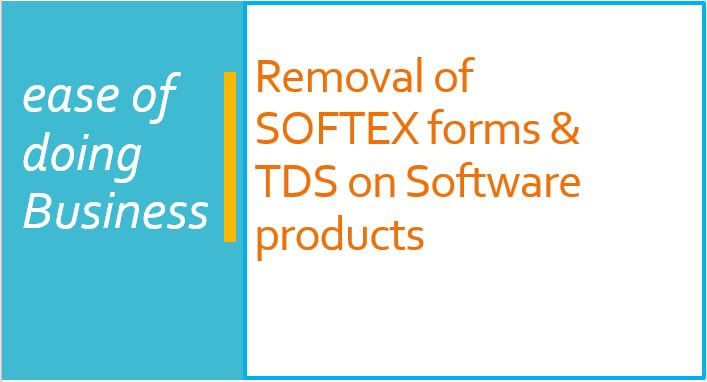Subsequent to announcement of the Software product policy there was an expectation in Software product industry that Government of India will make sweeping reforms to promote this Industry. In this regard we bring to your attention two below regulations that create hurdle in ease of doing business very specifically for Software product trade.
- SOFTEX forms filing for international trade
- TDS on domestic Software product sales
We have been representing through iSPIRT time and again to removal of both these provisions to no avail. Given below is a very short representation on why they are totally unrequired regulation in today’s time.
Given below is the explanation on why these two provisions should be removed. A video recording of same is embedded below.
SOFTEX form
This form was brought in place to regulate remittances received on foreign exchange on exports, especially in early times of Indian Software industry with advent of Software Technology Park Scheme. The form governs two major aspects given below, with reasoning why this form is an obsolete a redundant mechanism.
- The foreign exchange remittances due against the exports invoiced has been duly received. RBI systems manage this in synch with Authorized dealers (Banks).
- The valuation of exports was to be certified by STPI/SEZ.
Both these provisions can be regulated through GSTN digitally in case of Software product exports and does not require an extra interference by STPI.
GSTN system should be used by RBI to govern quantum of exports: After GST has come into place, all exports are Invoiced as “Export Invoices” and can be well regulated through GST system. All exports of a Indian company can be well regulated through GSTN and Remittances matched with banking systems. Why should there be one more redundant filing for this purpose. The regular Software exporters also file a LUT with GST online.
Products do not require valuation: There in no valuation of Software product required as these are standard products with a List price / MRP based mechanism unlike Software services where there is case to case variation. Software products are traded just like any other products /goods based on MRP or volume-based discounts.
Most Software products are downloaded or used on cloud (SaaS/PaaS mode). These procurements happen online in majority of cases.
SOFTEX form puts a very unnecessary burden on Software product companies for compliance and an extra cost both on internal Administration and fees paid to STPI.
TDS on Software
In 2012 budget a provision to deduct tax at source (TDS of 10%) was brought in, mainly to check the loss of tax income when Software was procured from foreign entities. However, this was also imposed on purchases of Software from domestic Companies.
The provision is a heavy burden specially for Small and Mid-Size Software product companies as in order to effectively deal with this provisions the Software product companies are now forced to float one more entity to avoid burdening their trading channels from TDS by end buyers.
This is totally unjustified provision as no other product is subjected to TDS.
A Software product is like any other product which is produced and sold unlimited number of times.
The TDS provisions
- A huge friction of Digital India concept as it hinders trade of Software products Digitally
- Does not bring any extra tax revenue to Government
This reform is highly desired and Removal of these two provisions will greatly benefit and boost the moral of Indian Software product industry and strengthen Indian Software product eco-system, which is much desired in present global economic conditions.
We sincerely request Government of India to expeditiously act on removal and reform of these provisions. Ministry of Electronics and IT should take up leadership on this and get these bottlenecks removed.
Disclaimer: The views expressed here are not in nature of legal advice but a consensus opinion in iSPIRT internally and Software product Industry at large.



